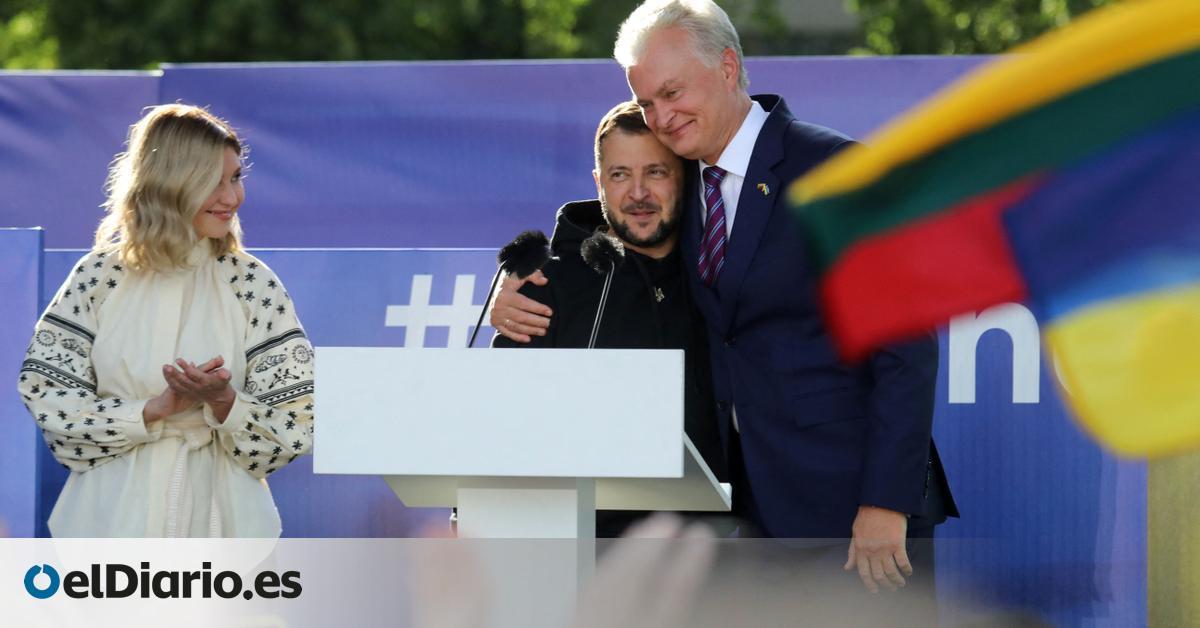
“Invitation”. It is the word that was not in the NATO statement approved this Tuesday at the Vilnius (Lithuania) summit two days ago. But in the end it has entered, despite the reluctance of the United States and Germany, according to sources familiar with the negotiation: the Baltics and Poland have been the main allies of the Ukrainian president, Volodímir Zelenski, in his aspiration to cross the gates of NATO . And you can only join NATO with an “invitation”. This was announced by the Secretary General of NATO, Jens Stoltenberg, in an appearance after the first day of the summit: “The invitation will be sent when the conditions are met. You have to understand the type of modernization of the institutions, the reinforcement of governance, corruption and the armed forces. We are working on it, on modernizing the institutions and the agreed interoperability between armies. But there is also a war in the Ukraine, when there is a war it is not the time to become a member of the Alliance. In the end, it has to be the allies who agree, it’s how we make decisions in NATO. We include the word ‘invitation’ and we will provide the means for Ukraine to join NATO”.
And what exactly does the statement say? “The Alliance will support Ukraine in carrying out reforms on its way to future accession. We will be in a position to extend an invitation to Ukraine to join the Alliance when the allies agree and the conditions are met”.
NEW: Vilnius Summit Communiqué agreed by #NATO Heads of State and Government#NATOSummit
Full statement ⤵️
— Oana Lungescu (@NATOpress) July 11, 2023
Indeed, the word “invitation” has others ahead and behind, which are the ones that do not quite convince the Ukrainian president. The 31 allies support the concept with two ideas: that the right conditions exist –basically, when the war ends– and that, then, there must be an agreement by the members for this.
Of course, the allies do not indicate a calendar or specific deadlines, which has sparked criticism from Zelenski: “Ukraine deserves respect. Now, on the way to Vilnius, we have received signals that a wording without Ukraine is being discussed. And I want to stress that this is a wording for an invitation only, not for Ukraine’s accession. It is unheard of and absurd that there is no timetable for Ukraine’s invitation or accession; and strange terms being added about ”conditions” even for Ukraine’s invitation… There seems to be no willingness to invite Ukraine to NATO or make it a member. Uncertainty is a weakness. And I will speak about this candidly at the summit.”
We value our allies. We value our shared security. And we always appreciate an open conversation.
Ukraine will be represented at the NATO summit in Vilnius. Because it is about respect.But Ukraine also deserves respect. Now, on the way to Vilnius, we received signals that…
— Volodymyr Zelensky (@ZelenskyyUa) July 11, 2023
Zelenski arrived in Vilnius this Tuesday afternoon, where he plans to have dinner with the rest of the allies so that tomorrow he can attend, for the first time, the NATO-Ukraine Council, a newly created body that forms part of the reinforced security package for Ukraine approved by NATO members at the summit.
In addition to that advice, NATO members have been negotiating the concept of “bilateral security guarantees” between the different members and kyiv. The formula, which also does not seem very good to Ukraine and some of its main allies, such as Poland, is the same one that was being used with Finland and Sweden before they joined the Alliance. Because? Because guarantees can only be given between NATO countries and countries outside; NATO as an entity in itself cannot engage in this way with a third country. In the end, the concept does not appear in the final release.
Another issue that Zelensky has also achieved is the simplification of Ukraine’s entry procedures. NATO Secretary General Jens Stoltenberg announced on Tuesday that the members of the Atlantic Alliance have agreed to abolish the Membership Action Plan (MAP): it means that the Ukrainian government would not have to participate in a program several years to demonstrate that it has carried out the necessary military, economic and political reforms to join the military alliance. “Instead of two steps to membership, there will be one,” Stoltenberg has said: “This is what we’ve removed now. It is a significant difference from the 2008 summit, and also the aid program for Ukraine.”
Source: www.eldiario.es

